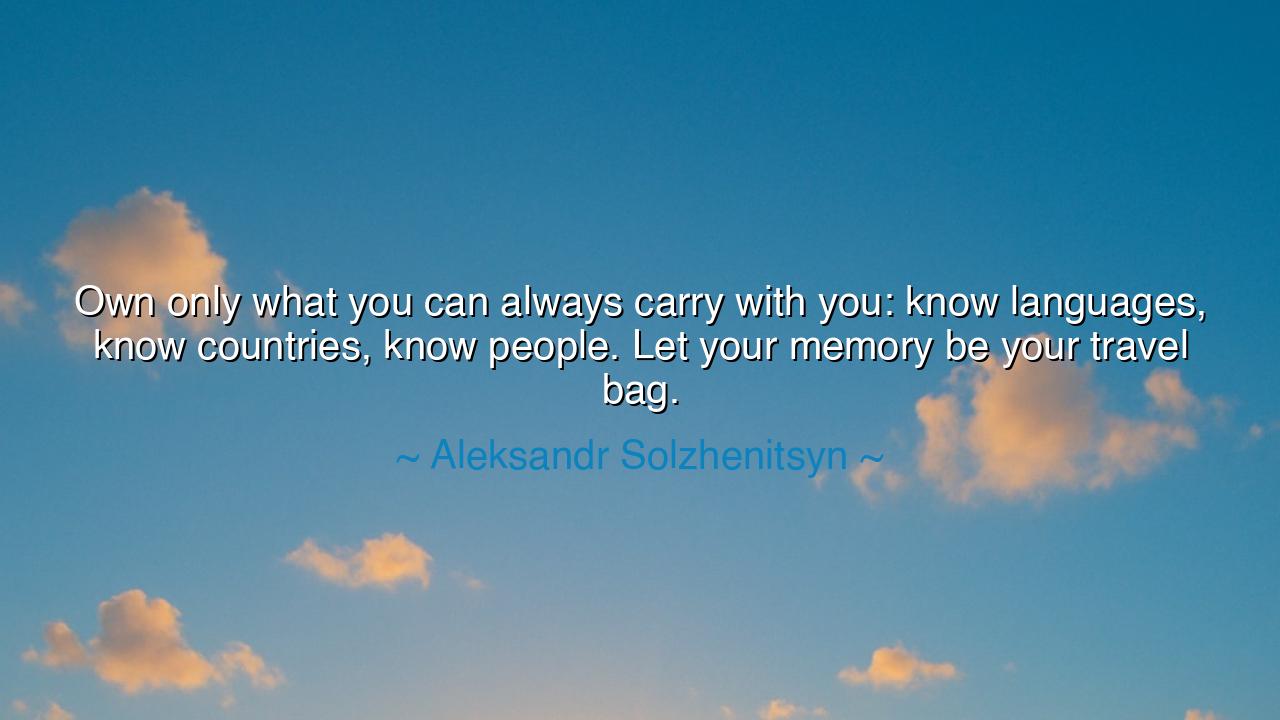
Own only what you can always carry with you: know languages
Own only what you can always carry with you: know languages, know countries, know people. Let your memory be your travel bag.






Hear the solemn wisdom of Aleksandr Solzhenitsyn, a man who endured the gulags of Siberia and carried his truth through exile, who declared: “Own only what you can always carry with you: know languages, know countries, know people. Let your memory be your travel bag.” These words rise not from comfort but from suffering, not from ease but from hardship, for Solzhenitsyn knew how swiftly the world can strip a man of his possessions, leaving only what is bound to his soul.
In these words, he reveals a philosophy born of survival: material wealth is fragile, subject to theft, decay, and tyranny. But knowledge, understanding, and memory cannot be confiscated. Languages open doors no border guard can close. Knowledge of countries and people gives strength when a man is far from home. Memory, preserved in the heart, becomes the one true treasure that endures when all else is lost. Solzhenitsyn, cast from his homeland, stripped of freedom, clung to what could not be taken—the wealth of mind and spirit.
The ancients, too, proclaimed this truth. When Diogenes the Cynic was asked how he could live without possessions, he replied that his true home was the world, and his wealth was freedom from need. Socrates, condemned and imprisoned, declared that wisdom and virtue were riches greater than gold. Solzhenitsyn echoes these same teachings, sharpened by the cruelty of modern tyranny: own only what no prison can take, what no exile can erase.
Consider the tale of Viktor Frankl, survivor of the Nazi concentration camps. His captors seized his clothes, his manuscript, his family—everything material was destroyed. Yet they could not strip him of his inner strength, his knowledge, his memory of love, his understanding of the human will. From this he wrote Man’s Search for Meaning, a book that outlived all his tormentors. Like Solzhenitsyn, Frankl proved that true wealth is carried within, in what no chain can bind.
The power of this teaching lies also in its universality. You may not face gulags or exile, but life itself is uncertain. Fortunes vanish, homes burn, and empires fall. Yet the one who has cultivated wisdom, who knows the languages of men, who remembers stories and friendships, carries a wealth that no fire nor flood can destroy. In this way, the mind and the soul become the traveler’s eternal baggage, lighter than silk, stronger than iron.
The lesson, then, is clear: do not devote yourself to amassing what moth and rust can consume. Instead, build your treasury in knowledge, in compassion, in understanding. Travel not only across lands but into the lives of others. Learn their songs, their words, their sorrows. Carry them with you in your memory, so that wherever you go, you are never poor, never empty, never alone.
Practically, this means shifting our values. Instead of chasing possessions, chase experiences. Instead of hoarding wealth, hoard wisdom. Learn a new language; speak with strangers; write down your reflections. Fill your inner travel bag so deeply that when the world strips you bare, you will still walk with abundance. For the richest man is not he who owns much, but he who carries within himself treasures that endure beyond time.
So let Solzhenitsyn’s words be carved into the stones of memory: “Let your memory be your travel bag.” For when all else is taken, the stories you know, the souls you have met, the love you have given, and the wisdom you have gathered will be your eternal wealth. This is the legacy of those who endured exile, prison, and war, and yet emerged with treasures untouchable—treasures carried forever within.






AAdministratorAdministrator
Welcome, honored guests. Please leave a comment, we will respond soon